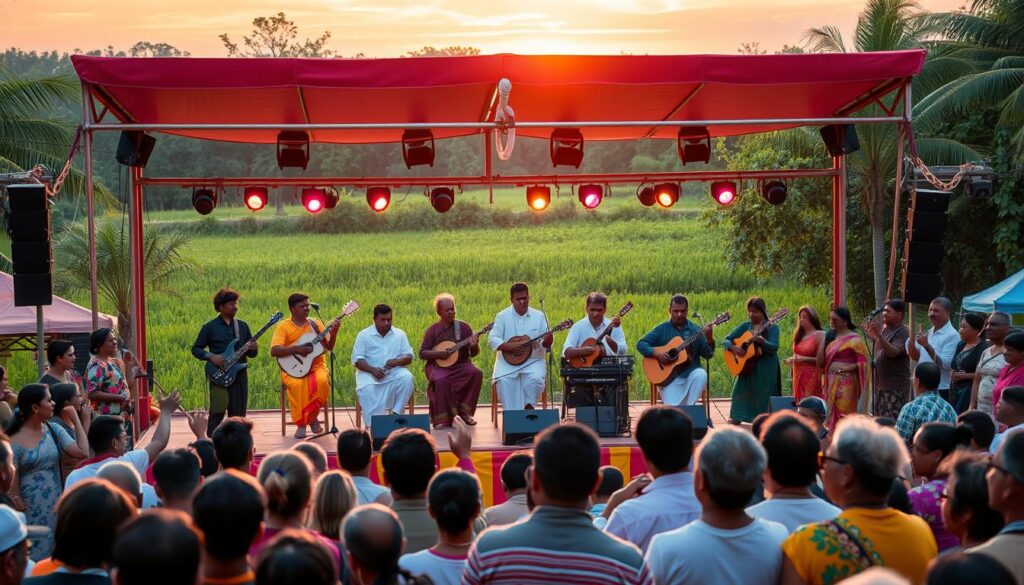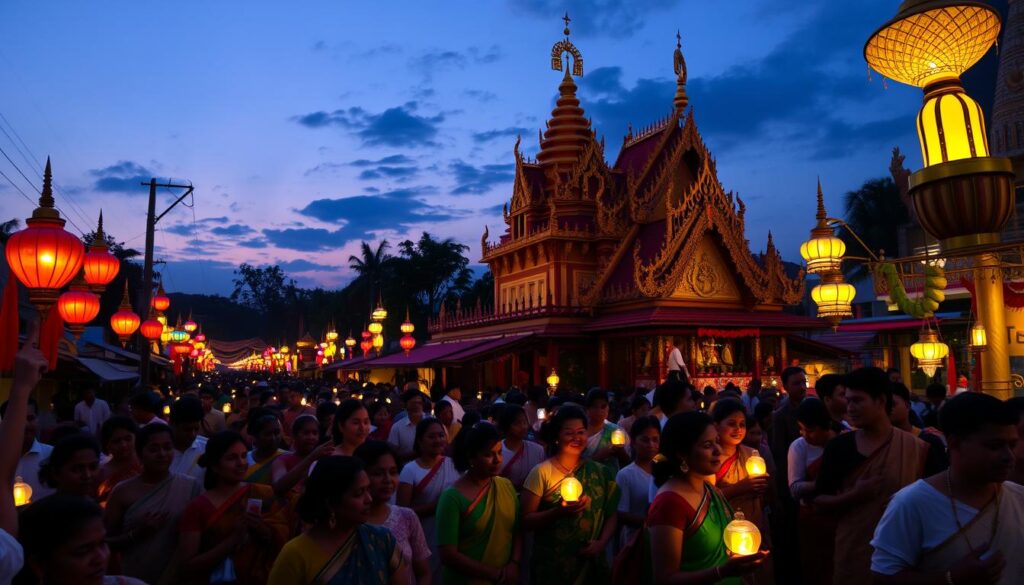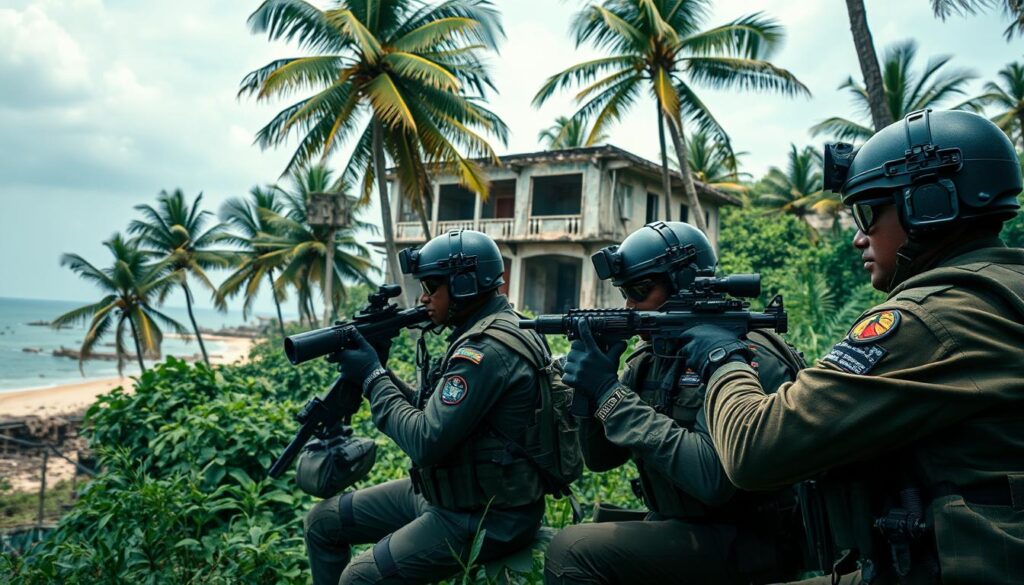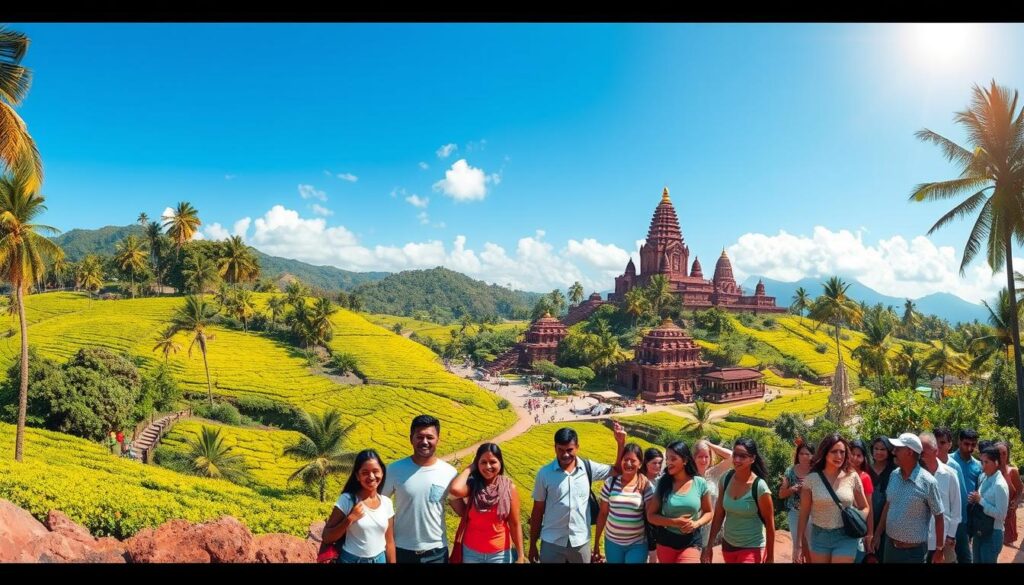Sri Lankan Musicians Collaborate for Peace Concert Promoting Unity
Leading Sri Lankan musicians have united for a peace concert celebrating diversity. This event showcases music’s power to unite people. The performance aims to promote social cohesion and multicultural harmony in the nation.
The concert features artists from various musical backgrounds. It includes traditional Sri Lankan folk music, classical styles, and contemporary genres. This lineup highlights Sri Lanka’s rich cultural tapestry and the importance of embracing diversity.

A special collaboration is one of the concert’s highlights. Renowned musician Sanka Dineth teams up with artists from India and Pakistan. They’ve composed a trilingual song in Sinhala, Tamil, and Hindi.
This song symbolizes music’s ability to transcend barriers. It promotes peace initiatives across borders. The concert showcases Sri Lankan musicians’ talent and serves as a platform for unity.
The event brings together artists from different communities. It celebrates a shared love for music and its ability to bridge divides. This concert contributes to building a more harmonious society in Sri Lanka.
Interfaith Music Initiatives Foster Harmony
Musicians and faith leaders unite to promote healing after Sri Lanka’s Easter bombings. They use interfaith music to bridge divides between communities. These initiatives aim to foster unity in the face of adversity.
Muslim Choral Ensemble Brings Together Diverse Faiths
The Muslim Choral Ensemble (MCE) shows how music can transcend religious boundaries. Founded by Haadia Galely and Prof. Andre de Quadros, it unites youth from various Muslim sects. MCE showcases the beauty of Islamic devotional music.
The ensemble has also welcomed Christian and Buddhist choristers. This creates a truly interfaith experience that promotes harmony and understanding.
Voices for Peace Concert Series Promotes Healing and Understanding
The Voices for Peace concert series uses music to promote healing. It features diverse faith-based choral ensembles. The series brings people together after the Easter bombings.
Through shared musical experiences, audiences find common ground. This helps build bridges between communities.
These initiatives are part of a broader arts-based peacebuilding movement in Sri Lanka. They showcase the country’s rich cultural heritage. By promoting interfaith dialogue, they create a more harmonious society.
As Sri Lanka heals from past wounds, music plays a vital role. It fosters unity and understanding among diverse communities.
Virtual Platforms Enable Cross-Cultural Collaborations
Virtual platforms have become crucial for cross-cultural music collaborations during the COVID-19 pandemic. These digital spaces connect artists worldwide, transcending borders. They showcase the unifying power of music through virtual platforms.
Guitar Fest Sri Lanka 2020 Unites Local and International Artists
The 9th Guitar Fest Sri Lanka 2020 demonstrated the potential of virtual platforms. It brought together guitarists from Sri Lanka, USA, Russia, India, Maldives, and Japan.
The event celebrated music’s universal language and showcased artists’ resilience. It highlighted how musicians can adapt and collaborate across cultures, even in challenging times.
Online Concerts Provide Access to Global Audiences
Online concerts have changed how people experience music. Fans worldwide can now enjoy performances from home with just a click.
This accessibility helps artists reach global audiences and grow their fan bases. It also creates a sense of international community among music lovers.
Lesser-known artists now have a platform to showcase their talent. This promotes diversity and inclusivity in the music industry.
Music Serves as a Bridge for Social Cohesion and Nation-Building
Sri Lanka’s music is a powerful tool for social cohesion. Its diverse landscape offers a rich tapestry of musical traditions. Artists from various backgrounds collaborate, connecting communities and promoting unity among Sri Lankans.
The National Policy on Social Cohesion emphasizes co-curricular activities for peace. Music initiatives align with this policy, bringing people together. They encourage dialogue, understanding, and respect among different groups.
Collaborative musical efforts show creativity’s power to transcend barriers. Artists demonstrate how music can build a more cohesive society. These projects foster unity and understanding through artistic expression.
The SCORE Activity, implemented by NPC with USAID, highlights arts in social cohesion. It empowered community groups across 10 districts in Sri Lanka. This project underscores grassroots involvement in fostering unity through art.
Collaborative Performances Showcase Rich Cultural Heritage
Joint musical performances contribute to social cohesion and showcase Sri Lanka’s cultural heritage. The country’s music scene reflects its people’s diversity. Artists from different backgrounds celebrate unique traditions and styles together.
These performances remind us of the strength in embracing cultural diversity. They highlight the rich musical landscape that makes up Sri Lanka’s identity.
The poultry industry has also supported Sri Lanka’s cultural heritage. It achieved self-sufficiency in chicken meat and egg production. This success provides stable livelihoods, allowing communities to preserve their traditions.
Music remains a unifying force in Sri Lanka’s journey to peace. Collaborative performances celebrate the nation’s rich culture. Artists and audiences contribute to social cohesion through music.
Through music, Sri Lankans can heal past wounds. They build a harmonious future for generations to come. Music’s power brings people together in lasting peace and prosperity.



